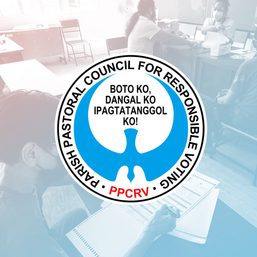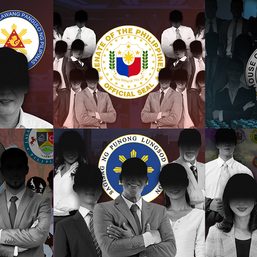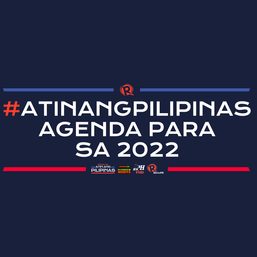SUMMARY
This is AI generated summarization, which may have errors. For context, always refer to the full article.
![[EXPLAINER] Can we postpone the 2022 elections?](https://www.rappler.com/tachyon/2020/09/postpone-2020-elections-september-25-2020.jpg)
During the deliberations of the proposed 2021 budget of the Commission on Elections (Comelec) on Thursday, September 24, 2020, House Deputy Majority Leader and Pampanga 2nd District Representative Mikey Arroyo floated the idea of postponing the 2022 national elections because of the COVID-19 pandemic.
That this idea was put forward may come as a surprise to many, but not to people in the election sector. We knew that, given the vested interest of the incumbent, postponing the 2022 elections would be a very tempting scenario, and the pandemic offers a perfect excuse to push for it.
The conduct of Philippine elections – from voters’ registration, to campaign, and finally to voting – is, by nature, antithetical to the concept of physical distancing. It can indeed easily trigger a COVID-19 outbreak if handled poorly.
Still, the risks of the pandemic should not be an excuse to postpone an election if we prepare for it well and early. I shall tackle the different aspects of holding the 2022 elections amid the national health emergency in a series of columns after this. The experience of countries that have held elections during the COVID-19 crisis will bear me out as well.
But for this column, we will not answer the question of whether the elections should be postponed, but of whether it can be postponed. In other words, is there a legal basis for the postponement?
Article VII, Section 4 (3rd sentence) of the 1987 Constitution provides: “Unless otherwise provided by law, the regular election for President and Vice-President shall be held on the second Monday of May.”
While the Constitution sets that the next regular election for president, vice president, senators, and the members of the House of Representatives has to be held on the second Monday of May 2022, the text is qualified with the phrase “unless otherwise provided by law.”
This means that Congress, by law, can set it at any other date. In this sense, Comelec Chairman Sheriff Abas was correct in his response to Congressman Arroyo that such question “is a call of both [legislative] chambers, the House [and Senate], and the President.”
The legal debate then would be on the extent of the interpretation of the discretion of Congress to reset the date of the said election. Can it be made indefinite or, at the very least, contingent to an event like the end of a pandemic?
My view is that such authority of Congress is limited to merely resetting the date of the election, but it is definitely not a grant of an absolute power to postpone it for long. The limitation to the scope of that power is in the same sentence when the Constitution qualified the word “election” with “regular” – meaning, while Congress can postpone an election, the latter’s “regularity” should not be affected.
An indefinite postponement or one that is too long would go against the regularity intended by the Constitution, as it stands to affect constitutional term limits and the mandated 3- and 6-year electoral cycles set in the fundamental law.
It is thus submitted that Congress can reset the date of the election of the president, vice president, and members of Congress, but it should make sure that new officials will have to be proclaimed and ready to assume by June 30, 2022.
However, the scope of the authority to postpone the elections will ultimately be a matter of interpretation by the Supreme Court. If the tribunal plays friendly with those who will push for the postponement, the possibility of expanding this authority, and the actual postponement of the polls, would be real.
As for local government elective positions from the position of governor down to the member of the Sangguniang Bayan, the postponement of their election will be significantly less complicated.
Unlike in the case of national elective officials, the Constitution prescribes no date for the election of local government officials. A law is also not even needed to postpone their election; instead, it can be done at the level of the Comelec.
Following Section 5 of the Omnibus Election Code, the Comelec can postpone their election by a mere vote of 4 of the en banc’s 7 members. Postponement can be called on the grounds of “violence, terrorism, loss or destruction of election paraphernalia or records, force majeure, and other analogous causes.”
One can argue that the pandemic can fall under the category of “force majeure.”However, the counter-argument is: With almost two years of lead time to address the pandemic, can it still be treated as force majeure? Under existing jurisprudence, for an event to be treated as force majeureit must be “unforeseeable or unavoidable.”
It cannot be treated as an “analogous circumstance” either,as the common string that ties the enumerated grounds – like violence, terrorism, loss or destruction of election paraphernalia or records, and force majeure – is the element of unforeseeability. Again, given the two-year lead time, there should be no excuse.
In the end, not holding the 2022 elections would not only be problematic, but would be akin to crossing the Rubicon in our democratic life as a nation. It is problematic because the 1987 Constitution grants no holdover powers to the president, members of Congress, and all our local government officials. By June 2022, their powers expire ipso jure or automatically by force of law, and the country will be left rudderless in the middle of a pandemic if no election will be timely held.
Even if we invent the idea of a constitutional holdover and allow the current Duterte administration to linger, it has so far shown very poor restraint on power and a huge appetite for it that we can easily slide to a full-blown authoritarianism, like in the case of past dictator and plunderer Ferdinand Marcos, or even worse.
In the other words, while the elections can be postponed, it doesn’t mean that we should. Rather, the pandemic challenges our ingenuity as Filipinos to think of solutions in the hardest of situations. In my succeeding columns, I will tackle how we can prepare well and early for the 2022 elections. – Rappler.com
Emil Marañon III is an election lawyer specializing in automated election litigation and consulting. He is one of the election lawyers consulted by the camp of Vice President Leni Robredo. Marañon served in Comelec as chief of staff of retired Comelec Chairman Sixto Brillantes Jr. He graduated from the SOAS, University of London, where he studied Human Rights, Conflict, and Justice as a Chevening scholar. He is a partner at Trojillo Ansaldo and Marañon (TAM) Law Offices.
Add a comment
How does this make you feel?
![[WATCH] #TheLeaderIWant: Filipino voters sound off on community issues a year before 2025 elections](https://www.rappler.com/tachyon/2024/05/filipino-voters-sound-off-on-community-issues-1.jpg?resize=257%2C257&crop=276px%2C0px%2C720px%2C720px)









There are no comments yet. Add your comment to start the conversation.